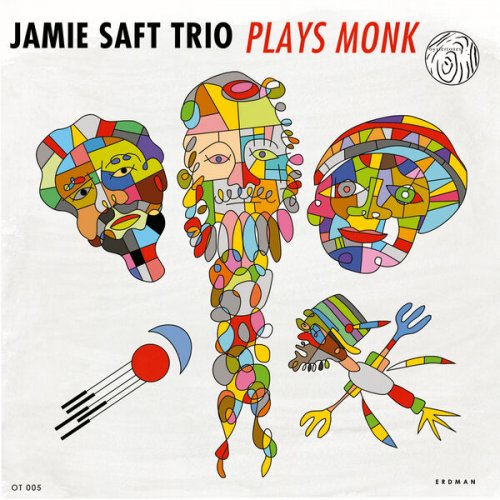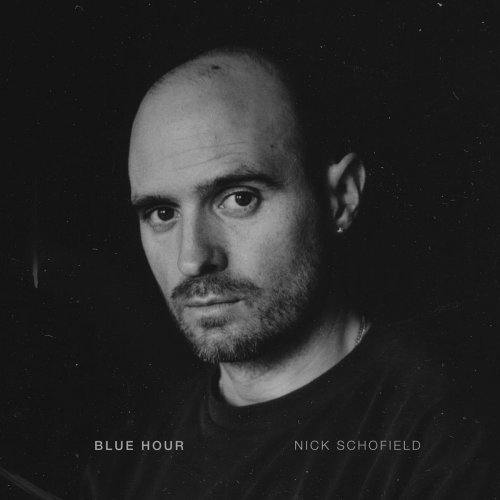Jamie Saft Trio & Jamie Saft - Jamie Saft Trio Plays Monk (2024) [Hi-Res]

Artist: Jamie Saft Trio, Jamie Saft
Title: Jamie Saft Trio Plays Monk
Year Of Release: 2024
Label: Oystertones
Genre: Jazz
Quality: Mp3 320 kbps / FLAC (tracks) / 24bit-96kHz FLAC (tracks)
Total Time: 56:37
Total Size: 133 / 322 MB / 1.05 GB
WebSite: Album Preview
Tracklist:Title: Jamie Saft Trio Plays Monk
Year Of Release: 2024
Label: Oystertones
Genre: Jazz
Quality: Mp3 320 kbps / FLAC (tracks) / 24bit-96kHz FLAC (tracks)
Total Time: 56:37
Total Size: 133 / 322 MB / 1.05 GB
WebSite: Album Preview
1. Raise Four (7:00)
2. Reflections (8:45)
3. Monk's Mood (5:29)
4. Thelonious (3:07)
5. Ruby, My Dear (4:49)
6. Coming on the Hudson (6:05)
7. Everything Happens to Me (3:49)
8. Panonica (4:21)
9. Children's Song (5:45)
10. Ugly Beauty (7:30)
Authenticity in music is a challenge for some, an obligation for others, and a natural way of being for a few, a rarefied result of deep focus, hard work and commitment for anyone. Theolonius Monk stands as one of the tallest monuments to authenticity in music. His greatness, which is enhanced by his complex modesty displayed in elaborate and still singable melodies and jagged but always danceable rhythms, inspires every musician who encounters his music. He once said “I like to keep it simple so people can dig it”. He matched that plan with the layers of complexity and beauty.
Playing Monk’s music is hard. Playing it correctly, on the composer's terms, is harder. Some who attempt it treat the songs as standard tunes, vehicles for stylized blowing. While they certainly are standards, they are also compositions that offer deeper possibilities and demand more attention than that. More than anything Monk’s compositions make a sound unlike any other. He knew that, and in a famous Downbeat interview he made it clear that with the exception of Bud Powell, few came close to getting it right. His list of directions including “What you don’t play can be more important than what you do play“, and “...play the melody!” aren’t easy to follow.
Jamie Saft obviously understands all of this. His playing on this recording is proof. The harmonies are right, the pacing is right, the melody is there all the time, the risk, the rhythm and ability to leave things out, all factor into the best possible result. By walking the Monk tightrope, balancing each note, placing one after the other with consideration and momentum he gets The Sound. His balance keeps him from falling into imitation and keeps him moving forward to a new interpretation. He doesn’t use Monk’s music to show off. Instead he treats it as if it is worthy of the same treatment he would give to Bach or Cage. He honors it with precision to the stated and the implied aspects that Monk built into his music and uses that perfect scheme to add his own ideas. You can hear them in his phrasing of the melodies, his voicings and placement of the chords, his unique way of soloing, which is as off-kilter as Monk’s and totally different, and his own sense of momentum. But he also plays the whole song with the approaches and extensions that need to be there to complete the material. As an original master improviser he accomplishes the rarest thing, he transforms the music with subtlety.
Hamid Drake and Brad Jones on drums and bass respectively add their one masterful voices with the same care and authority, always being who they are. They don’t hold back or go too far. The feel is right but also fresh. The music flows easily on their terms always working within the sound of Monk. All three of them get it right. Their individual capabilities and creative comtributions are authentic. They show their understanding and respect for Monk by being themselves inside the Maestro’s sound. The results are a version made in our time that savors and furthers the values of the original.
Monk’s ultimate bebop genius direction is “You got to dig it, to dig it. You dig?” Jamie Saft, Hamid Drake and Brad Jones do.
Jamie Saft- piano
Bradley Christopher Jones- contrabass
Hamid Drake- drums
Playing Monk’s music is hard. Playing it correctly, on the composer's terms, is harder. Some who attempt it treat the songs as standard tunes, vehicles for stylized blowing. While they certainly are standards, they are also compositions that offer deeper possibilities and demand more attention than that. More than anything Monk’s compositions make a sound unlike any other. He knew that, and in a famous Downbeat interview he made it clear that with the exception of Bud Powell, few came close to getting it right. His list of directions including “What you don’t play can be more important than what you do play“, and “...play the melody!” aren’t easy to follow.
Jamie Saft obviously understands all of this. His playing on this recording is proof. The harmonies are right, the pacing is right, the melody is there all the time, the risk, the rhythm and ability to leave things out, all factor into the best possible result. By walking the Monk tightrope, balancing each note, placing one after the other with consideration and momentum he gets The Sound. His balance keeps him from falling into imitation and keeps him moving forward to a new interpretation. He doesn’t use Monk’s music to show off. Instead he treats it as if it is worthy of the same treatment he would give to Bach or Cage. He honors it with precision to the stated and the implied aspects that Monk built into his music and uses that perfect scheme to add his own ideas. You can hear them in his phrasing of the melodies, his voicings and placement of the chords, his unique way of soloing, which is as off-kilter as Monk’s and totally different, and his own sense of momentum. But he also plays the whole song with the approaches and extensions that need to be there to complete the material. As an original master improviser he accomplishes the rarest thing, he transforms the music with subtlety.
Hamid Drake and Brad Jones on drums and bass respectively add their one masterful voices with the same care and authority, always being who they are. They don’t hold back or go too far. The feel is right but also fresh. The music flows easily on their terms always working within the sound of Monk. All three of them get it right. Their individual capabilities and creative comtributions are authentic. They show their understanding and respect for Monk by being themselves inside the Maestro’s sound. The results are a version made in our time that savors and furthers the values of the original.
Monk’s ultimate bebop genius direction is “You got to dig it, to dig it. You dig?” Jamie Saft, Hamid Drake and Brad Jones do.
Jamie Saft- piano
Bradley Christopher Jones- contrabass
Hamid Drake- drums
![Angelo Moore - The Medicine Cabinet (2026) [Hi-Res] Angelo Moore - The Medicine Cabinet (2026) [Hi-Res]](https://www.dibpic.com/uploads/posts/2026-02/1770633721_61lemna6xtl.jpg)

![Bobby Hutcherson - Components (1965) [LP] Bobby Hutcherson - Components (1965) [LP]](https://www.dibpic.com/uploads/posts/2026-02/1770471883_front.jpg)

![Sonny Stitt & Red Holloway - Forecast: Sonny & Red (Remastered) (2026) [Hi-Res] Sonny Stitt & Red Holloway - Forecast: Sonny & Red (Remastered) (2026) [Hi-Res]](https://www.dibpic.com/uploads/posts/2026-02/1770394432_ssrh500.jpg)
![Bill Evans Trio - Sunday At The Village Vanguard (1961) [2023 DSD256] Bill Evans Trio - Sunday At The Village Vanguard (1961) [2023 DSD256]](https://www.dibpic.com/uploads/posts/2026-02/1770661877_front.jpg)
![Rok Zalokar - Pieces for Collective Change (2025) [Hi-Res] Rok Zalokar - Pieces for Collective Change (2025) [Hi-Res]](https://img.israbox.com/img/2026-02/09/bdwqrbl1honjxisedtld75o3t.jpg)

![Victoria Alexanyan - VISHAP (2026) [Hi-Res] Victoria Alexanyan - VISHAP (2026) [Hi-Res]](https://img.israbox.com/img/2026-02/06/fp18m8tfhi28on3z9gks3ab7v.jpg)